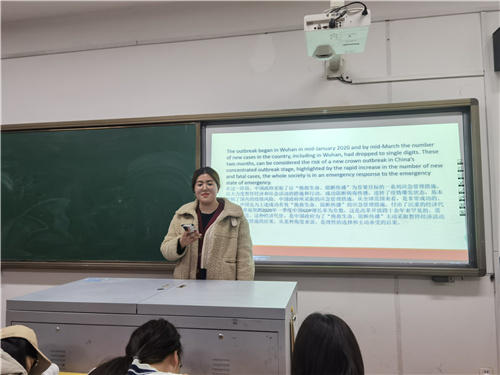大家好,我是来自英语20404班的宋雨洁,今天我演讲的题目是《新冠肺炎实际病例数量超预期》。
The outbreak began in Wuhan in mid-January 2020 and by mid-March the number of new cases in the country, including in Wuhan, had dropped to single digits. These two months, can be considered the risk of a new crown outbreak in China's concentrated outbreak stage, highlighted by the rapid increase in the number of new and fatal cases, the whole society is in an emergency response to the emergency state of emergency.
At this stage, the Chinese government has adopted a series of emergency management measures with the primary goal of "saving lives and blocking transmission", and has successfully stopped the spread of the virus, reversed the outbreak and basically controlled the risk of an outbreak in China. The emergency management measures taken by the Chinese government have been very successful globally.
However, China has also paid a heavy economic price for the above-mentioned successful and effective emergency management measures to "save lives and stop transmission" -- the agency widely forecasts negative GDP growth in the first quarter of 2020, a rarity in more than four decades of reform and opening-up. It should be emphasized that this economic cost is the result of the Chinese government taking the initiative to suspend economic activities and other emergency management measures in order to "save lives and stop transmission", and in a way, it is the result of rational choice and initiative.
Since mid-March, local transmission cases are close to zero, Chinese society from the "new coronavirus outbreak of a large-scale outbreak of the state of emergency", successfully changed to "the new coronavirus transmission risk of persistent risk latent state", the risk of new coronavirus transmission remains and will be long-term.
"The impact of the new coronavirus pneumonia outbreak on China's economy is a short-term external shock and has little impact on the medium- and long-term development trend of the economy." Wang Xiaoguang, deputy director of the economics department of the Central Party School (National School of Administration), said that in general, a major emergency in a country will inevitably have a negative impact on short-term economic development, but will not have a substantial impact on the medium- and long-term economy, pending the impact of calm, economic and social activities will return to normal.
According to expert analysis, in the short term, the service industry will have a greater impact on the service industry in February and March, with tourism, catering, hotels and aviation being the most affected, and commercial retailing, including online shopping, will be greatly affected due to the decline in express availability. For industry and construction, the first quarter had a slight impact, mainly in February and March, when it returned to normal.
Yang Liqiang, an associate researcher at the Institute of International Economics at the University of International Business and Economics, said that measures such as "sealing the city", restricting the movement of people, and stopping production and stopping production of enterprises will impact China's economy in the short term, but these measures are conducive to the prevention and control of the epidemic. Pent-up demand during the outbreak will rebound after the outbreak, leading to a rebound in the economy, which is expected to gradually pick up in the second half of the year. In the medium to long term, the epidemic will not change the long-term trend of China's economic development to good.
"This outbreak can be seen as a short-term economic shock, with a short-term translation of the total demand and supply curve. However, over time, the impact will gradually weaken, economic growth will eventually return to the original trajectory. Therefore, the long-term does not affect the fundamental trend of economic good. "
新冠病毒疫情自2020年1月中旬在武汉爆发,到3月中旬全国包括武汉在内每日本土新增病例数下降到个位数。这两个月的时间,可以被认为是新冠疫情风险在中国的集中爆发阶段,突出表现为新增和死亡病例数快速增长,全社会处于应急反应的紧急状态。
在这一阶段,中国政府采取了以“挽救生命、阻断传播”为首要目标的一系列应急管理措施,以大力度暂停经济和社会活动的措施和行动,成功阻断病毒传播,逆转了疫情爆发状态,基本控制了国内的疫情风险。中国政府所采取的应急管理措施,从全球范围来看,是非常成功的。
但是,中国也为上述成功有效“挽救生命、阻断传播”的应急管理措施,付出了沉重的经济代价--机构普遍预测2020年一季度中国GDP增长率为负数,这是改革开放四十余年来罕见的。需要强调的是,这种经济代价,是中国政府为了“挽救生命、阻断传播”主动采取暂停经济活动等应急管理措施的结果,从某种角度来说,是理性的选择和主动承受的后果。
3月中旬以来,本土传播病例接近于零,中国社会从“新冠病毒疫情大规模爆发的紧急状态”,成功转变为”新冠病毒传播风险持续存在的风险潜伏状态“,新冠病毒传播风险仍然并将长期存在。
“新型冠状病毒感染肺炎疫情对我国经济的影响,属于短期外部冲击,对经济中长期发展趋势影响不大。”中央党校(国家行政学院)经济学部副主任王小广表示,一般而言,一国发生重大突发事件必然会对短期经济发展产生一定负面影响,但不会对中长期经济产生实质性影响,待冲击平息后,经济社会活动将一切回归正常。
专家分析认为,从产业来讲,短期内对2月份、3月份的服务业影响较大,其中旅游业、餐饮业、酒店业和航空业受影响最大;由于快递畅通性下降,包括网购在内的商业零售业会受到较大影响。对于工业和建筑业来说,一季度稍有影响,主要体现在2月份,3月份可恢复正常。
对外经济贸易大学国际经济研究院副研究员杨立强表示,“封城”、限制人员流动、企业停产停工等举措会使我国经济在短期内受到冲击,但这些举措有利于防控疫情。疫情期间被压抑的需求将在疫情过后集中反弹,带动经济回升,预计下半年我国经济将逐渐回暖。从中长期看,疫情不会改变我国经济发展长期向好的大趋势。
“此次疫情可视为一个短期的经济冲击,使总需求和总供给曲线有一个短期平移。但是,随着时间延长,冲击将逐渐减弱,经济增长终究还是要回到原有的轨迹。因此,长期内不影响经济向好的根本趋势。”
审稿人:李春苗
外国语学院晨曦养成教育学社
2020年11月23日


